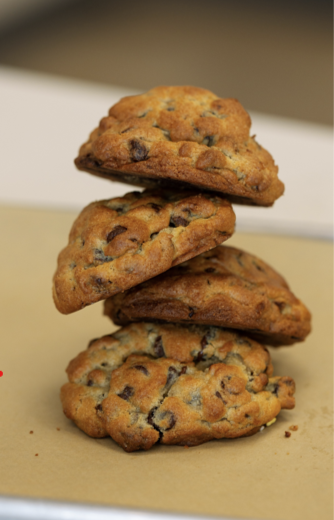The Secret Science of Perfect Cookies: Baking Soda vs. Baking Powder
Mar 25, 2025
Welcome to the sweet world of KCookie Company! Today, we're diving into the science of baking to help you make the most delicious cookies ever. If you've ever wondered why some cookie recipes call for baking soda while others use baking powder (or both!), you've come to the right place. Let's break it down in a fun and easy way! This is a question I’ve received a lot during Sunday Q&As.
Baking Soda: The Magic Activator
First up, baking soda! This humble ingredient is a powerful leavening agent that helps your cookies rise and spread. But baking soda doesn't work alone—it needs an acidic ingredient to activate it. Common acids in cookie recipes include brown sugar, yogurt, lemon juice, and even chocolate. When baking soda meets acid, a chemical reaction occurs, producing carbon dioxide gas. This gas creates tiny bubbles that make your cookies light, fluffy, and oh-so-tasty!
Baking Powder: The Double Whammy
Now, let's talk about baking powder. Unlike baking soda, baking powder already contains an acid (usually cream of tartar), along with a drying agent (like cornstarch) to keep it stable. This means it doesn't need any extra acidic ingredients to work its magic. Most baking powders are "double-acting," which means they activate in two stages: once when mixed with wet ingredients and again when exposed to heat in the oven. The result? Extra lift and fluffiness for your cookies!
The Dynamic Duo: When to Use Both
Sometimes, a recipe calls for both baking soda and baking powder. Why? Because they each bring their own special benefits to the table. Baking soda helps with spreading and browning, while baking powder provides additional lift. Together, they create the perfect balance of texture and flavor. It's like having the best of both worlds!
Cookie Catastrophes: What Happens If You Use One Instead of the Other?
- Only Baking Soda: If you use only baking soda without an acidic ingredient, your cookies might turn out flat and overly browned. They could also have a slightly metallic or soapy taste. Yikes!
- Only Baking Powder: If you use only baking powder, your cookies might rise too much and become cakey rather than chewy. They might also lack that nice golden-brown color. Not ideal!
Pro Tip: Always follow the recipe closely and measure your ingredients accurately for the best results. Baking is a science, after all!
Join the KCookie Community by going to our website and leaving your email or joining us on Instagram!
We love sharing our baking tips and tricks with you! Whether you're a seasoned baker or just starting out, we're here to help you achieve cookie perfection. Share your baking adventures with us by tagging @kcookiecompany on Instagram. We can't wait to see your creations!
Thank you for being a part of the KCookie family. Stay tuned for more baking secrets, fun facts, and delicious recipes. Happy baking!



